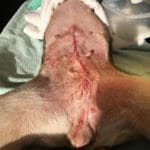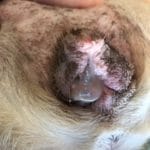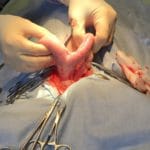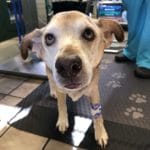Inappropriate urination is often the first noticeable sign something is wrong. Increased thirst means this has been going on long enough to be a total body problem. I would put a lot of effort into getting her seen sooner than later…going too long can and will cause further damage to her already very sick body.
(Dr. M told me bad breath is kidneys. Expect a full urinalysis and bloodwork, plus the possibility of subcutaneous fluids and prescription diet.)
















Hello,
I think that it perfectly acceptable to go back to your vet and express your concerns. I also think it is completely inappropriate to not have offered loads of options, everything from medications to inhalers, to humidifiers your supplements to referral in this case. I also think that all vets should be willing to do a sedated oral cavity exploratory exam to look for a polyp. But that’s just me and lots of vets think I am too generous with my patients and clients. So maybe you should talk to your vet and ask friends family and all local cat people for a referral to someone who will give your more help and meaningful treatment options. Let me know what happens. Good luck!